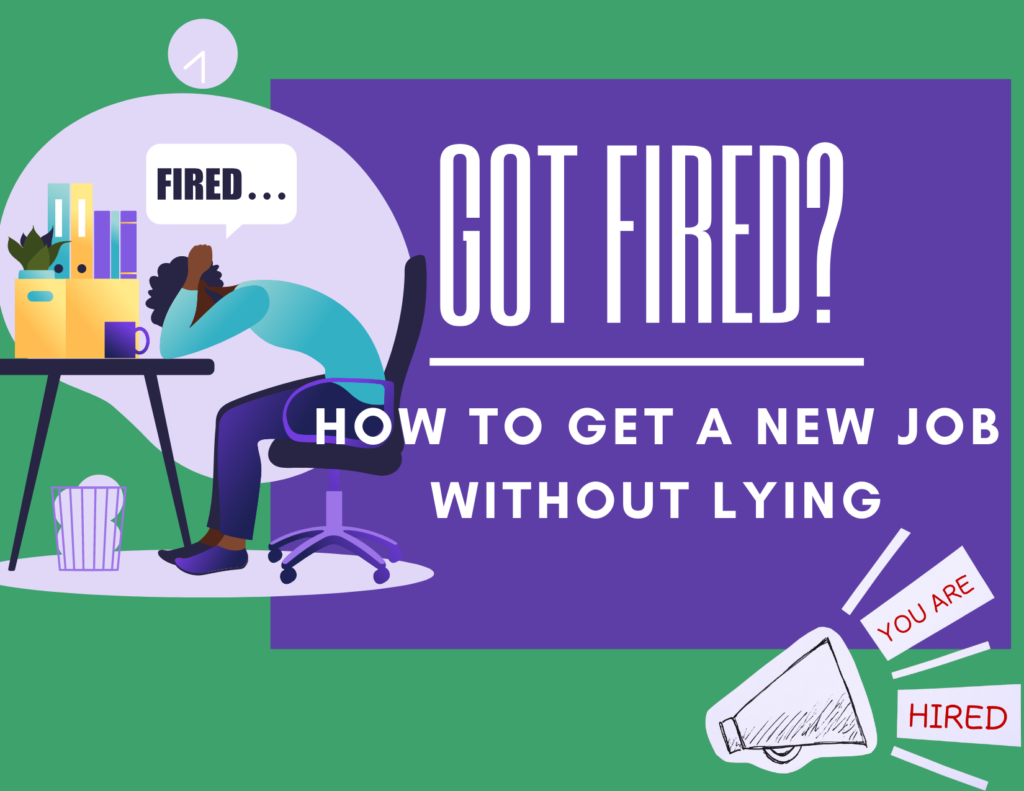Got Fired? How to Get a Job After Being Fired Without Lying.
Being fired is a traumatic experience, both on your ego and your wallet. That’s why the faster you get a job after being fired, the better. The longer you are unemployed, the harder it is to remain motivated to get a job. In addition, short gaps of time between jobs are often overlooked. Meanwhile, longer gaps of time between jobs on your resume are scrutinized more, making unemployment harder to overcome.
The keys to getting a job after being fired without lying are acknowledging that you were fired, accepting responsibility, and adjusting your behavior. This method can apply to situations where you are partially or fully responsible for being fired. This method can also work if the reason why you were fired is that your former boss is a jerk. I will show you how to acknowledge the issue, accept responsibility, and adjust your behavior in an objectively factual way, without shouldering blame. NOTE: This is not legal advice – if you are involved in a retaliation or discrimination action, seek the advice of counsel!
I Got Fired From My First Full-Time Job!
After I was fired from my first full-time job, it was extremely difficult for me to find a new job. I had only done volunteer, and part-time work before the bank teller position. Being fired from a bank put a big black mark on my already short resume. Although I wasn’t fired for stealing (I was fired for tardiness and inattention to detail), I believed that being fired from a bank created the impression that I was untrustworthy. To make things worse I could not get an employment reference. My firing was one of those “walk out the door carrying a box of your belongings” firings, so everybody knew I got fired. The bank would only provide employment verification of the dates I worked there and my job title.
I couldn’t avoid the “why did you leave your last job” question on job applications and during interviews. There was no way I was going to admit that I got fired, so I lied. I stated that the bank was a temporary job and that the temp assignment came to an end. Unfortunately, I didn’t have an answer for the name and phone number of the temp agency, so that excuse didn’t work. I even tried giving out an incorrect phone number for my former bank supervisor, hoping that the new employer would not be able to find the correct number and give up. That did not work either. I had to make another plan.
How to Bounce Back and Get a Job After Being Fired
There is no one-size-fits-all approach to getting a new job after being fired. Many variables impact what approach is best for you such as: have you been fired once or multiple times, did you leave gracefully or belligerently, or whether you were fired at the beginning, in the middle, or toward the end of your career? However, in most situations, you can take these steps to bounce back from being fired and get a new job without lying.
Use the 3 As : Acknowledge, Accept, Adjust
The objective of the 3 A’s is to answer questions that your new employer wants to know about why you were fired before they are asked. This way, you take ownership of the issue and take control of the conversation about why you were fired. When you own it, you lessen the chances that your interviewer will probe the issue and you keep the interview moving forward.
Acknowledge the Issues:
Acknowledge that the reason why you were fired was partially due to your performance or behavior. This doesn’t mean falling on the sword and spilling your guts In a job interview. You don’t have to be specific or long-winded. A simple statement that generalizes the situation is good enough. For example, I was fired from my bank teller job for being habitually late, having inaccurate balance sheets that needed constant fixing, and being a slow worker. However, in the paragraph above where I told you the story, I wrote that I was fired for tardiness and inattention to detail.
Think about your situation and describe the reason why you were fired in general terms. For example, suppose you got fired after an argument about the work with your boss or a coworker. Could you say you were expressing your opinion about a project you thought was headed in the wrong direction? Perhaps you were passionately debating an issue during a team meeting and it turned into a heated discussion.
Practice restating the reason why you were fired in a concise and general way. Also, be prepared with a few sentences to describe the situation if someone asks for details. For example, In my case, I would say “I depended on unreliable public transportation and didn’t leave early enough. Also, I worked in a busy bank branch in a business district where I struggled to keep up with the paperwork.”
Accept Responsibility:
Follow up your acknowledgment statement with an acceptance statement. This isn’t about whether the reason why you were fired was your fault. It’s about telling the new employer “if I could have a do-over, here’s what I would have done.” In my case, I would say “I knew that bus was always late and I should have asked for an adjustment to my schedule or left earlier to get to work.” “ I felt too embarrassed to ask for help. However, I should have spoken up and told my supervisor that I was having trouble.”
Practice coming up with one or two sentences to accept responsibility. Briefly state the problem in terms of what you did or didn’t do. Next, describe something within your control that you could have done differently to avoid or solve the problem. Using the previous example where you were fired after an argument with your boss or a coworker: you could say “I felt like that project was my baby. It was hard to stand by and watch it fail. I shouldn’t have taken my boss’s difference of opinion so personally.” Or, you could say “ I was so focused on defending my position that I didn’t notice that I became argumentative and dominated the team meeting. I shouldn’t have continued to talk about such a hot issue in front of the team.”
Adjust Your Behavior:
Follow up your acceptance statement with a factual behavior adjustment statement. This is where you tell your prospective new employer why they should give you a chance. Tell your new employer what you learned from the situation and what you would do, if given the chance to prove yourself. In my case, I would say that “It was a hard lesson, but I learned the importance of being punctual. Now, I make it my business to arrive early wherever I go.” “I also learned to ask for help. Next time, if I am having a hard time, I’ll let my supervisor know. I will also ask a coworker to review my work so I can correct my mistakes before handing in my final work product.”
Practice coming up with one or two behavior adjustment sentences. Briefly state what you learned, and what you have done or will do to avoid a repeat of the issue that led to your firing. Using our previous example, you could say “ I learned that I need to remain objective about my work and be more receptive to opposing viewpoints. I’ll continue to take trainings to improve my listening skills.” Or you could say “ I learned that team meetings are the wrong setting for certain kinds of discussions. From now on, I’ll stay on topic in team meetings and talk to my coworkers about sensitive topics separately.”
Acknowledge, Accept and Adjust Altogether:
Here’s how this works together. Question: “Why were you fired from your last job?” Answer: “I was fired for tardiness and inattention to detail. I depended on unreliable public transportation and didn’t leave early enough. That bus was always late. I should have asked for an adjustment to my schedule or left earlier to get to work. It was a hard lesson, but I learned the importance of being punctual. Now, I make it my business to arrive early wherever I go.”
“I also worked in a busy bank branch in a business district. Keeping up with the paperwork was a struggle. It was embarrassing so I didn’t ask for help. I should have spoken up and told my supervisor that I was having trouble. From this experience I learned to ask for help. Next time, if I am having a hard time, I’ll let my supervisor know. I will also ask a coworker to review my work so I can correct my mistakes before handing in my final work product.”
Go back to the other two examples above and put the sentences together to make complete acknowledgement, acceptance, and adjustment statements. Now try making acknowledgement, acceptance, and adjustment statements of your own to use in your next interview.
More Strategies for Getting a New Job
In addition to the 3 As method, here are some other things you can do to get a new job after being fired. Unfortunately, I didn’t learn the 3 As until much later after I was fired. I had such a hard time getting hired that I stopped putting the bank job on my resume; I felt I was better off having a longer period of unemployment on my resume than even mentioning that job. I forfeit the entire job experience, took a different and lower-level job, and worked my way back up. In time, I learned to do things like the 3 As, and things from the list below. I overcame being fired, and put the bank job back on my resume.
- Reflect and take training in your areas of weakness to demonstrate proactivity to improve your performance or behavior.
- Ask a person (other than the person who fired you) who would know your work performance to provide a positive reference for you.
- Be willing to take a lower level job and work your way back to where you were – don’t let your pride get in the way!
- Consider taking a different career path where that previous job is less important – work the skills you have to transition to the next chapter of your work life story.
- Contact your network to ask about job opportunities – you may need to do the 3 As so your network feels more comfortable leveraging their professional connections to help you get a job.
- Look for temporary or short-term employment to close the unemployment gap on your resume. You can build up positive references this way.
- Volunteer Work and Internships to fill in periods of unemployment. Unpaid work still counts toward your work history.





